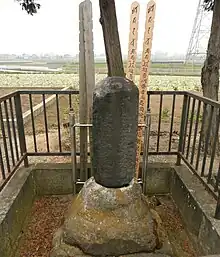Kunisada Chūji
Kunisada Chūji (国定 忠治, 1810–1851) was a popular figure in the Edo period. He was a bakuto (gamblers commonly seen as forerunners to the modern yakuza).
His story is mainly responsible for the romanticised "chivalrous bandit" or "Robin Hood" image in Japan. An example was when a village had a famine, he helped the village out.[1]
He was publicly executed in 1850 for various crimes after a large man-hunt.
Chūji is depicted on a 1999 Japanese stamp.

Kunisada Chūji's grave in Isesaki.
See also
- A Diary of Chuji's Travels (忠治旅日記 Chūji tabi nikki)
- Films based on his story in 1954, 1958 and 1960
References
This article is issued from Wikipedia. The text is licensed under Creative Commons - Attribution - Sharealike. Additional terms may apply for the media files.